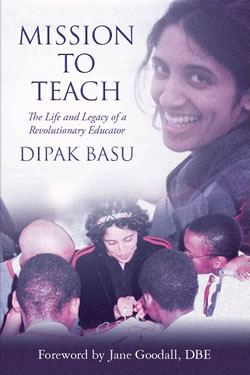BOOK REVIEW
‘Mission To Teach: The Life and Legacy of a Revolutionary Educator’
Review By Merri Rosenberg
 Mission To Teach: The Life and Legacy of a Revolutionary Educator
Mission To Teach: The Life and Legacy of a Revolutionary Educator
By Dipak Basu. Foreword by Jane Goodall, DBE.
Published by JBF Books, 2013
The stories of dedicated, passionate young teachers are a familiar motif in educational literature. Often those stories of the idealistic young re-ignite a dormant spark in weary, discouraged veterans, who are in turn inspired to recapture that same spirit as they deal with the students in their classrooms.
When these stories involve an especially brilliant, fierce and selfless young woman who died of metastatic breast cancer at the age of 31 in 2008, the sadness and poignancy are particularly profound.
This work is a labor of love by Jhumki Basu’s father to commemorate, celebrate, and inspire others to understand exactly how gifted his daughter was, and what a significant difference she made in the world during the — too short — time she was given.
Jhumki Basu was a curious, inquisitive, intellectually-driven child, who pursued science as an undergraduate at Stanford, ultimately earning both a master’s and Ph.D simultaneously from Teachers College at Columbia. Her strong sense of social justice was apparent even as an undergraduate, when she went to post-Soviet Russia to study the issue of homelessness there. Before her death, Jhumki was promoted to an associate professor at New York University, a recognition of her scholarly contributions and exceptional teaching skills. Even as she lay dying, she met with her Ph.D. advisor to extract a promise that the professor would complete Jhumki’s textbook on democratic science teaching. No wonder that Jhumki Basu was awarded a posthumous Early Career Achievement Award by Teachers College.
For what mattered to Jhumki was teaching science to inner-city children in a way that would spark their own connection to the material, in a model she developed, Sci-Ed Innovators. Besides working with inner-city students in New York City, she applied her talents to neglected parts of Palo Alto, East Menlo Park, and Redwood City, in Silicon Valley—and also worked in South Africa’s black township, Soweto.
Jhumki Basu may have been a visionary, and an idealist, yet she was well aware of her students’ many challenges. In speaking with one of her friends, she said, “I tell myself I cannot expect my students to listen and concentrate when they are hungry. I cannot expect them to do things when they are hurting emotionally. Or when they just have things bigger than science in their lives right then. So I will not have that expectation of them, and I will not have the expectation of myself, because it is unrealistic.”
What emerges from this often painful biography/memoir is a vivid portrait of a dynamic, brave young woman who overcame a series of serious personal challenges without ever letting them defeat her, who held true to her vision of what education could be, and whose luminous spirit touched the lives of all who encountered her. Her father’s tribute is a loving, brave legacy for his awesome daughter. #
